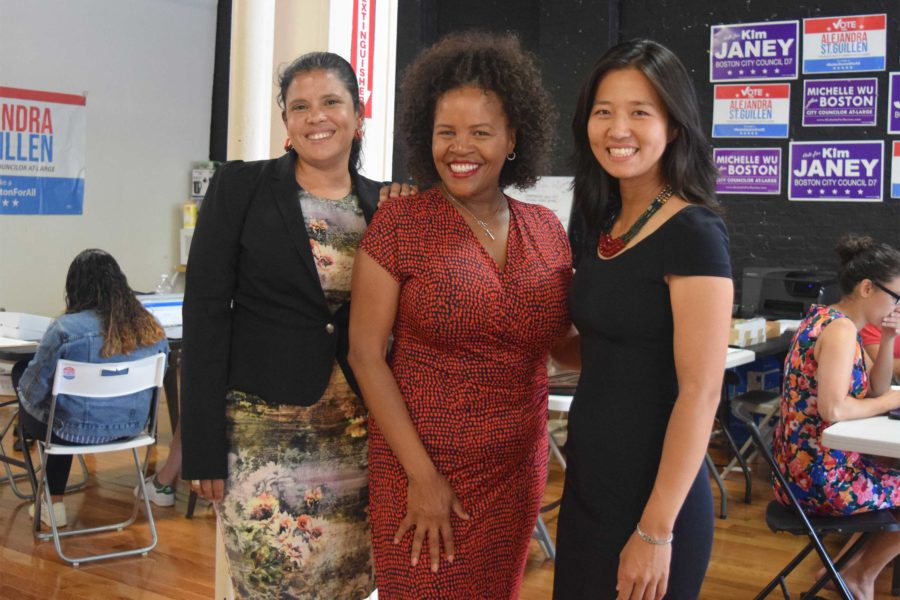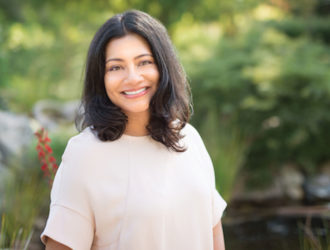In the middle of the day on a Wednesday in July, at a campaign office at 195 Dudley Street, in Roxbury, about a dozen staff and volunteers are working away on long fold-out tables in an open, one-room space.
With the Boston City Council primary on Sept. 24 less than 10 weeks away, phone calls to potential voters are being made and door knocking strategies are being mapped out.
While this sounds like a typical campaign office, it’s anything but.
In a pioneering move, incumbent Boston City Council candidates Michelle Wu and Kim Janey, and newcomer candidate Alejandra St. Guillen — who is gunning for Wu’s At-Large seat — are all sharing this campaign office.
This type of alliance in a city council race has never been done before, with the exception of former At-Large City Councilor, now U.S. Congresswoman, Ayanna Pressley, who shared campaign resources with former At-Large City Councilor John Connolly when they ran for re-election in 2011.
When most people think of a political race, they might imagine it entails candidates engaging in top-secret strategizing, fierce fundraising and maybe even undermining the competition — not sharing space in which to do so.
But for these three women, the upcoming municipal election isn’t just about winning; it’s about working collaboratively to reach as many people and achieve as many of their common goals as possible.
“One of the underlying goals of being together in a campaign space is to emphasize that it’s not just about Election Day,” says Wu, who has been serving as an At-Large City Councilor for three terms. “This is about building and empowering partnerships that will continue far beyond November. This year may be the most fundamental type of election for the city where we can engage residents about issues that will immediately and directly matter to them.”
At the heart of all three candidates’ values are equity, inclusion and “making sure all voices have a chance to be heard and have a seat at the table,” says Janey, who was elected to the council in 2017.
Historically, not every voice from every resident and their concerns, have always been heard by local government.
Wu talks about the first time she ran, in 2013. She says, “The traditional advice people give you is, you go where people are going to vote anyway … talk to those people and that’s it. It ends up just reinforcing cycles of inequality and disenfranchisement. We need to flip that on its head.”
The candidates agree that the shared campaign office model harkens back to Pressley’s bid for Congress last year, a grassroots campaign that expanded the electorate by engaging residents from diverse backgrounds, sometimes in their native Spanish, Chinese or Haitian languages.
The campaign office is in one of the neighborhoods Janey represents in her district and a precinct Wu previously polled second place in (behind former At Large Councilor Pressley). It is ground zero for addressing some of the city’s issues of inequality in areas such as reliable public transportation, affordable housing, strong local businesses and equitably funded public schools.
Janey says, “We know that in this particular community there are many disparities and many folks who have been marginalized and not included in the prosperity that we see throughout the City of Boston.”
In addressing these disparities, this new troika of female politicians is, in many ways, symbolic of women’s tendency to lead with compassion and cooperation.
Janey, Wu and St. Guillen are not without their own personal struggles, which helps them empathize and inform the way they lead and tackle issues.
St. Guillen lost her father to AIDS when she was 13 years old and then lost her sister at age 29 in a random act of violence in New York.
At age 23, Wu became the primary caretaker of her two younger sisters and mother who struggled with mental illness.
And, Janey became a mother as a teen, attending Smith College in her late 20s, and describes herself as a survivor of sexual and domestic abuse.
“We all have had different experiences, but have struggled and gone through challenges that are not typical of the traditional candidate,” says St. Guillen, who previously served as the director of Oiste, a Latino civic and political organization, and is married to her partner, Josiane Martinez. “You see through a different lens when you survive something. You see through a lens of empathy.”
Within the current Boston City Council body, six out of 13 councilors are women of color.
Janey describes how she and her female colleagues have structured public hearings, which typically can go on for several hours. Instead of hearing testimony from administrators first, the council hears from members of the public from the start.
Seemingly insignificant changes like this can ultimately impact how civically engaged women, working-class people and people of color are in local politics.
“These issues are tough,” says Janey, speaking from a constituent’s point of view. “It’s hard to get up and go to work every day, take care of your family, keep your house clean. And, now you want me to tackle affordable housing? You got to make it worth people’s time.”
Wu has also been known to occasionally bring her young children to community hearings, dispelling negative stigmas around working mothers.
The campaign office has an open door policy: Volunteers, staff and potential voters stream in and out from morning to night, raising issues or lending helping hands.
Janey, Wu and St. Guillen expressed possible plans for opening the space up to the community, either for stakeholder meetings or social justice protests, as well as for more social and celebratory occasions.
They say that despite the challenges in the city, “Roxbury is an amazing, strong, vibrant community and … we need to take time to celebrate each other.”
“That is how we build relationships, which is how we build trust,” says Janey. “Then, we tackle the big, tough issues.”



 4 min read
4 min read


